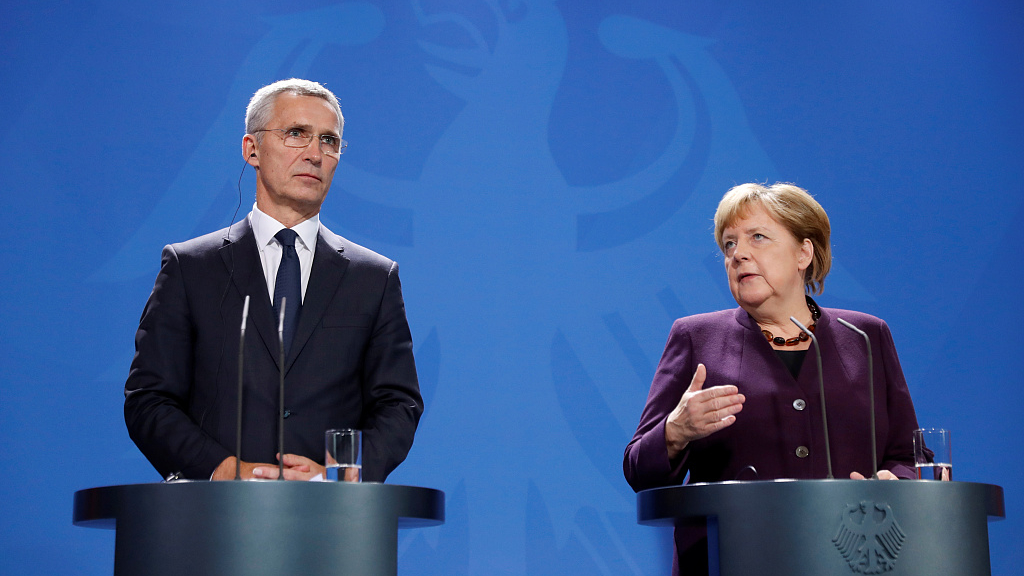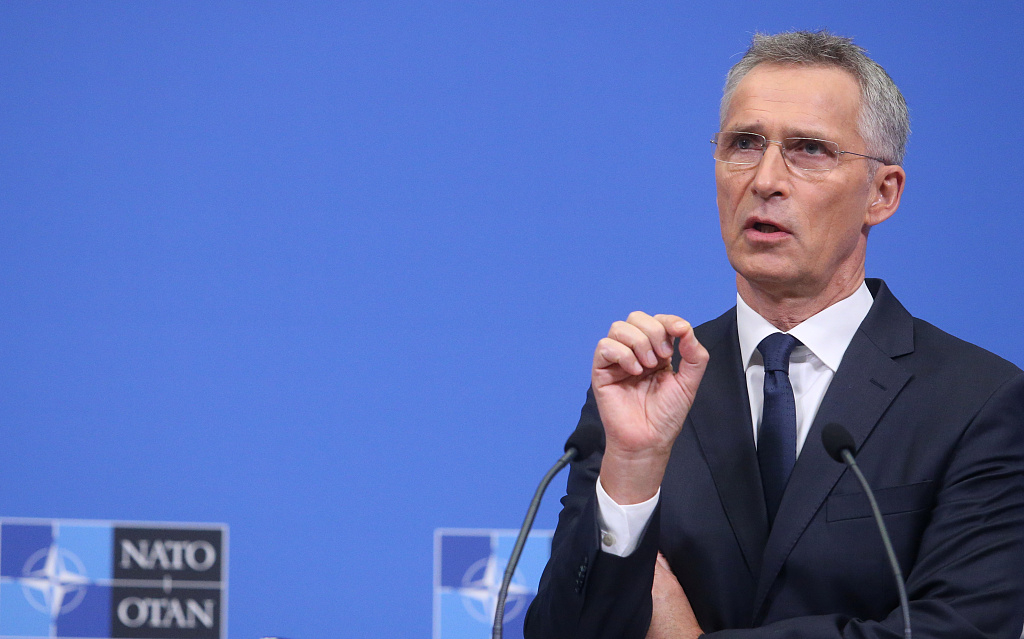
NATO Secretary-General Jens Stoltenberg and German Chancellor Angela Merkel address the media during a news conference in Berlin, Germany, November 7, 2019. /VCG Photo
NATO Secretary-General Jens Stoltenberg and German Chancellor Angela Merkel address the media during a news conference in Berlin, Germany, November 7, 2019. /VCG Photo
Editor's note: Zhao Yuanzhen is an opinion editor with CGTN Digital. The article reflects the author's opinions, and not necessarily the views of CGTN.
Has NATO become so crumbled that Macron has to claim NATO's "brain death?"
In an interview with the Economist magazine, French President Emmanuel Macron did not hesitate to criticize the current status of NATO, saying that there is "no coordination" between the U.S. and its NATO allies. He also lashed out against Turkey's military offensive in Syria as "uncoordinated aggressive action."
"Macron's comments have highlighted his discontent with Europe's current security strategy," says Liu Mingli, deputy director of the Institute of European Studies, China Institutes of Contemporary International Relations. "In the past, Europe relied only on NATO on security defense and used to take orders from the U.S. But that has changed after Trump taking office."
The new changes have signaled an America that has become less reliable as a security alliance. Europe's security concerns do not seem important to their transatlantic partnership, as Trump explicitly said to Macron that: "The terrorists, the jihadists that are over there, they're European, they're not American."
And Trump is telling the truth. It is Europe that is bearing most of the cost of the conflicts in the Middle East. The refugee crisis that erupted in 2016 was Europe's problem, not America's. At that time, Trump was calling for a global withdrawal of the U.S. and explicitly put America's interest above all countries, sometimes even at the cost of Europe. He has repeatedly called for NATO members to meet the two percent GDP defense budget, at a time when the European economy is already in a mire.
According to Liu, Macron's claim can be seen as an appeal for other European leaders to rethink and reflect on Europe's current security strategy, and whether Europe should still be a "junior partner" of the U.S. He has made use of Europe's current discontent to America's policy-including its trade policy and the Middle East strategy, to take a leadership role in Europe's foreign policy, particularly its relations with the U.S.

NATO Secretary-General Jens Stoltenberg speaks during a news conference after a NATO Defence Ministers meeting in Brussels, Belgium June 27, 2019. /VCG Photo
NATO Secretary-General Jens Stoltenberg speaks during a news conference after a NATO Defence Ministers meeting in Brussels, Belgium June 27, 2019. /VCG Photo
But are there enough countries that stand with Macron to "regain military sovereignty?" It seems at present Macron has not earned many followers on his plan to strengthen European defense cooperation. His comments soon encountered backlash in other European countries.
German chancellor Angela Merkel has quickly dismissed Macron's comment, saying that NATO is in Germany's interest, and it is also their security alliance. UK foreign secretary Dominic Raab also rejects the idea of weakening NATO, while calling for member countries to meet the two percent GDP target.
This divergence highlights one of the hurdles to establishing a "European army." Following Trump's criticism on NATO, some in Europe are indeed thinking about an independent security strategy rather than one dominated by the U.S. But on practical terms, losing America's support is still unbearable. The power vacuum left by the U.S. would be tough for Europe to manage. Russia's nuclear weapons are already powerful enough to deter any European country. And it is only because U.S. undertakes two thirds of the NATO budget that Europe can guarantee its security for decades with a military budget under two percent of their GDP.
Perhaps that is also why the European Intervention Initiative (EII) pushed by Macron has not made substantial progress. In the meantime, as EU's decision-making process is controlled by member countries, it is hard for them to take collective action if they cannot reach a consensus on primary foreign policy and security strategy.
Perhaps Germany's foreign minister Sigmar Gabriel's comments better summarize the embarrassing situation of Europe – that Europe can live without Trump, but it cannot afford to lose America. While the U.S. is reinforcing the discourse that Russia and China have become significant threats and wants to use NATO to serve its global interest, Europe is finding itself in a difficult position at a time when cooperation with China is yielding tangible results.
At least for now, Europe cannot afford to lose a "brain-dead" NATO.
(If you want to contribute and have specific expertise, please contact us at opinions@cgtn.com)